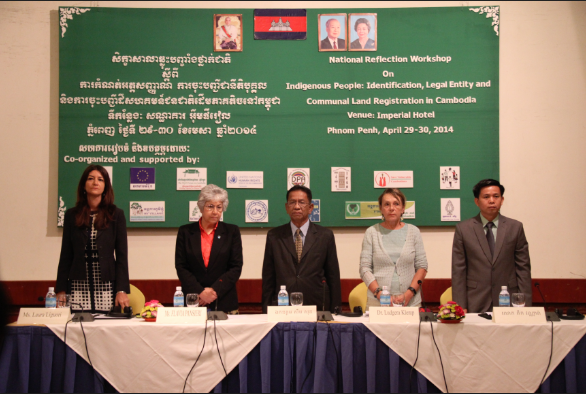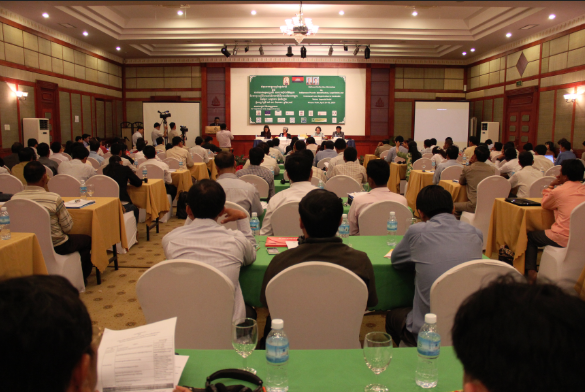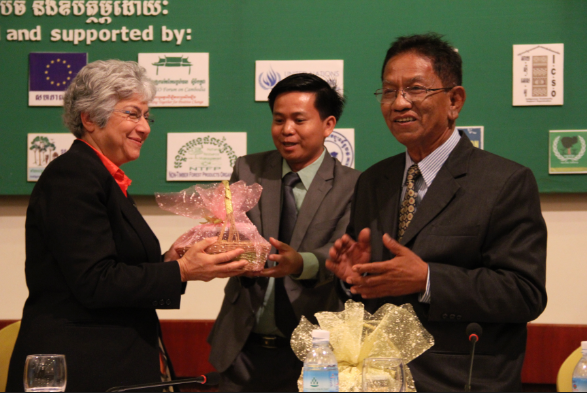
From left to right: Ms. Laura Liguori, Representative of the Delegation of the European Union to Cambodia, Ms.Flavia Pansieri, UN Deputy High Commissioner for Human Rights, H.E. Sim Son, Advisor to the Ministry of Rural Development, Ms. Dr Ludgera Klemp, Counsellor and Head of Cooperation, Embassy of the Federal Republic of Germany Phnom Penh, Mr. Tek Vannara, Executive Director of the NGO Forum on Cambodia
Phnom Penh, April 29 – 30, 2014: Ms. Flavia Pansieri, the UNDeputy High Commissioner for Human Rights, and approximately 140 participants from the Royal Government of Cambodia (RGC), NGOs, International Organizations, UN agencies, Development Partners and Indigenous People from the Communities of Kompong Speu, Preah Vihear, Rattankiri, Mondulkiri, Koh Kong, Battambang came to attend a two-day National Reflection Workshop on “Identification, Legal Entity and Land Registration for Indigenous Communities in Cambodia”.
The two-day national seminar aimed to give opportunities to all participants to meet and discuss current challenges in communal and collective land registration such as the lengthy and complicated process, and to identify ways to speed up collective land registration. Also discussed was how to issue collective titles according to international and domestic laws, policies and regulations.
“There are 24 ethnic groups, is about 1.4% of the total Cambodia population, living in 15 provinces in Cambodia… To date, only 8 indigenous communities have received collective land titles from the government. This is a huge concern for the rest of the communities,” said Mr. Tek Vannara, Executive Director of The NGO Forum on Cambodia during the event.
Ms. Flavia Pansieri, UN Deputy High Commissioner for Human Rights, said that, “In practice, what is happening in some degrees is that land concessions are receiving priority before communal land titling,” she said. (Phnom Penh Post, April 30, 2014)
After this workshop, the participants, especially the indigenous communities themselves were vocal in urging all relevant actors at the national level including RGC, NGOs, IOs, UN agencies, multi and bilateral donors to accelerate collective land titles.
 The Cambodian Land Law 2001 recognized indigenous communities’ rights to collective ownership to their traditional land. Equally, the Forestry Law 2002 recognizes rights of indigenous communities in shifting cultivation inside their collective land. In May 2012, the Royal Government of Cambodia declared a moratorium on the granting of ELCs and announced a review of existing ELCs1, combined with a new titling scheme2, which is currently being implemented and aims to grant land titles to 470,000 households on 1.8 million ha, living in ELC and forest concession areas as well as on state public land.3 Thousands of youth volunteers were deployed by the Government to demarcate private land. While the Directive 01 originally aimed to demarcate and register communal land for those IP communities in the process of communal land titling, communal land was not demarcated. On the contrary, the Directive had a negative impact on indigenous peoples. Villagers reported being pressured to accept private titles and of being forced to decide whether to accept them without adequate time for consideration, thus creating division within communities4and for those communities who were already in the process of receiving a CLT, the process was halted. 5 Among 76 communities in Ratanakiri, at least 26 ICs were negatively affected by the Directive No. 01. An assessment made by ILO concluded that 23 ICs in both Ratanakiri and Mondulkiri were affected by Directive No.01 as IPs accepted private titles over communal ones.
The Cambodian Land Law 2001 recognized indigenous communities’ rights to collective ownership to their traditional land. Equally, the Forestry Law 2002 recognizes rights of indigenous communities in shifting cultivation inside their collective land. In May 2012, the Royal Government of Cambodia declared a moratorium on the granting of ELCs and announced a review of existing ELCs1, combined with a new titling scheme2, which is currently being implemented and aims to grant land titles to 470,000 households on 1.8 million ha, living in ELC and forest concession areas as well as on state public land.3 Thousands of youth volunteers were deployed by the Government to demarcate private land. While the Directive 01 originally aimed to demarcate and register communal land for those IP communities in the process of communal land titling, communal land was not demarcated. On the contrary, the Directive had a negative impact on indigenous peoples. Villagers reported being pressured to accept private titles and of being forced to decide whether to accept them without adequate time for consideration, thus creating division within communities4and for those communities who were already in the process of receiving a CLT, the process was halted. 5 Among 76 communities in Ratanakiri, at least 26 ICs were negatively affected by the Directive No. 01. An assessment made by ILO concluded that 23 ICs in both Ratanakiri and Mondulkiri were affected by Directive No.01 as IPs accepted private titles over communal ones.
Organized by: The NGO Forum on Cambodia
Co-organized and supported by: MRD, ARD, CED, CLEC, DPA, GAA, HA, ICSO, MVI, NGO Forum, NTFP, OPKC, SVC, UNOHCHR, WCS, Ponlok Khmer, Mother of Nature, Samreth Law Firm

—
1 Directive 01 on Measure to Strengthen and Foster Effectiveness of ELC Management, dated 07 May 2012 (Khmer version), available at http://mlmupc.gov.kh/?page=detail&menu1=118&ctype=article&id=118&lg=kh
2As announced by the Cambodian Prime Minister on June 14, 2012 “ New Actions on Existing Policies”
3Speech of H.E. Im Chhun Lim, Senior Minister and Minister of Land Management, Urban Planning and Construction and Chairman of the Council for Land Policy, Phnom Penh, September 26, 2012 (unofficial translation)
4 Rabe, Alison: Directive 01BB in Ratanakiri Province, Cambodia: Issues and impacts of private land titling in indigenous communities, 2013, p. 18
5 Reversing Land Grabs or Aggravating Tenure Insecurity? Competing Perspectives on Economic Land Concessions and Land Titling in Cambodia, Oldenburg, Neef,Law and Development Review. Volume 0, Issue 0, ISSN (Online) 1943-3867, ISSN (Print) 2194-6523, DOI: 10.1515/ldr-2014-0014, May 2014